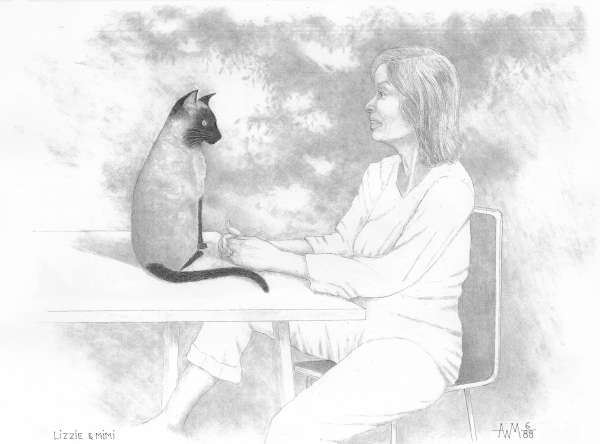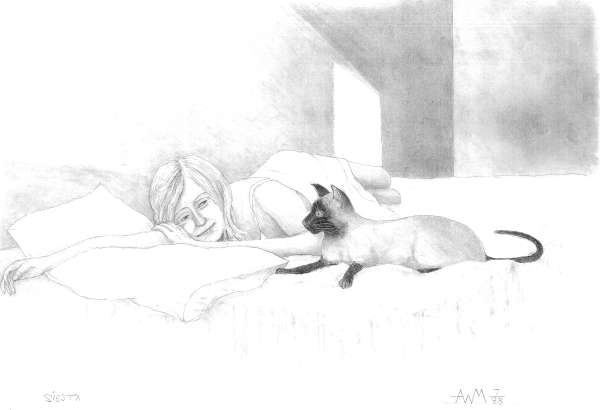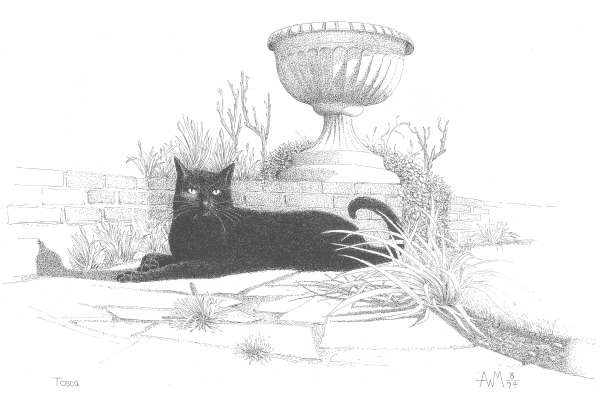
Derek wanted to remain in Tenerife; his escape plan for sun and sea and easy living brought him to the fishing village of Los Cristianos in 1987 where his outgoing nature could thrive. A man of courtesy and charm, yet a risk-taker who often flew the flag of indifference to matters that caused alarm in others, he became as we are - a letting agency - joined the English Club and became a familiar face. Emma, tall and elegant, who could have graced the world of haute couture, felt enclosed by our simple society, wanted to return home to be close to family and ex-colleagues and a more cultivated lifestyle. As a couple they were distinguished in appearance yet their sharply formed differences hardly ever reached the surface. The Dellows were not the closest of our friends although proximity over the years encouraged a certain familiarity; they were Wanstead people, and Emma and I worked in the same department of local government and occasionally we clashed amicably over cases. As a colleague maybe I should have recognised that Emma was a girl of the swinging metropolis and not the sort who would march down to the harbour of a morning to buy fish straight off the dock. When Anton and Maria returned to the Mainland, the Dellows, seeking a larger apartment that looked more like their Wanstead flat, bought D2/1 two floors below us. It was a last desperate stand to re-create home conditions abroad. They let their small Paloma Beach apartment for holiday rentals. And now, as neighbours, the hidden rocks of dissension were right beneath our feet. They had adult children; it was not just the root and branch of their children's lives that drew Emma back, but also the cameraderie of a few women work colleagues who came out on holiday, adding to her discontent. To encourage her to remain in Tenerife Derek introduced a kitten to the home, a chocolate point Siamese named Mimi. From two floors below, its strange howlings drifted upwards to our level. Alas, as a harbinger of hope poor little Mimi failed miserably. However, the couple's relationship was held together by something stronger than postman's elastic, so they agreed to return home 'and give it a try.' Even when newly retired I was never caught up by the system of 'doing good works'; I was often horrified by the amount of free time devoted to the work by female colleagues well passed retiring age, who still clung to the routines of case notes and tea breaks and volunteer home visits to problem families, hanging on to the work by their fingernails, habit being stronger than reason. I could visualise Emma getting like this? I put it to Derek when he handed the kitten over to us as temporary cat minders. "God help you, Derek. You'll be a house husband, baking lots of little cakes for groups of noisy problem kids, getting crayon out of the carpets, mopping spilled drinks, blowing up balloons, filling party bags. Don't get drawn in, Derek mate. Choose a hobby that gets you out of the house." "Nah! We'll be back, you'll see!" "I'll bet you won't! Wanstead is rather beautiful," I reminded him. "In Wanstead there is life of good quality and a great butcher on the High Street. You remember we used to get fresh fish from the fishmongers up by Wanstead Place? They wore traditional straw hats. Pity they had to go." "Maybe you're right. Emma won't leave her comfort zone. It's her life's work. All social workers should wear straw hats and striped aprons. Then you could see them coming!" "Derek duck. Social workers are funny people! I wouldn't have one in the house, no way, not no-how!" "I'm stuck with one! Like your missus is stuck with one. But we'll be back." "Best of luck, mate." Lizzie loves cats. I am somewhat less loving in that they are not allowed to dominate my life. At home I refused to get out of bed at 4am to let Oliver and Tosca out of the house, my theory being : if you ignore them, after a while they'll stop demanding and go away to be loved later. But Lizzie, roused by their scratchings at the bedroom door always responded. Yes, it could be that the benighted pair had made a dump or a sick somewhere so there was a logical figment to her response, except that A. Mann, being an early riser, was the usual discoverer of such delinquencies. Mostly they had enough common sense to use the litter tray so, by and large and in the main, they were a trouble-free pair of black moggies. We could have said no to the Dellows - we do not want your cat, take the noisy creature home with you. But that would have meant six months in quarantine while the Dellows continued the squabble about their future, and in this trial situation it seemed unfair to burden them with pet problems. Barrie and Joan had their garden full of semi-wild cats; the Stedmans had a Corgi; Basy had a dog and a goose and encouraged wild birds to perch on her garden bench. The only thing in our favour was that a cat in a fourth floor apartment would not pester to be let out at some ungodly hour. Lizzie looked suitably contrite when I reminded her - "So we can both sleep nights, my darling!" "You can empty the litter tray then!" "Okay, a deal!" And that is how we got Mimi. We had learned a few encouraging items about Siamese cats: they are the most popular of pedigree breeds and although Mimi's origins lacked provenance there was clearly no doubting her elegant style, her brilliant blue eyes, her noisy presence and active curiosity. She came up with Derek in the lift, her squeaks curtailed within a stout cardboard box. Thus we became cat keepers as distinct from cat owners, a restrictive fostering situation rather than open adoption. Admittedly she did nothing to encourage closeness for her affection lay elsewhere. What passes for affection from a cat came in hoarse howlings and vague wanderings around D4/1 looking for her owners. Little more than a kitten, we found her noise quite startling, but startling noises are to be expected from a Siamese-type moggie... 
Getting used to the Manns took Mimi a little longer than a week. Getting used to Mimi took the Manns much longer. She would appear in unexpected places. The tops of cupboards were favourite - but how on earth did she get inside cupboards? Her displays of innocence hid a depth of cunning beyond the normal purview of a mere cat. Mere cat! This was Mimi, a highly intelligent thief, who would steal any food that wasn't nailed down, so different from the politeness of our Wanstead pair, Oliver and Tosca. We dined out occasionally at La Fragua. Dining there was good, better when we asked for hot plates "platas calientes, favor!" Why a restaurant who could do such excellent chateaubriand should need to be reminded of the need for hot plates was hard to understand. But they were new to the game, the transfer from blacksmith to restauranteur in this small country village obviously lacked the panache of the city. The place was done up like the forge it certainly was before holiday visitors stole its identity. The hammers no longer smote music from the anvil; the furnace bed, bare of coke, held some variously decorated locally made pots; the walls still held the long handled crocodile tongs that I well remembered, tongs that were never long enough to prevent sparks from burning your arms; and there were horse shoes and the curling blade of a plough that were exactly the same the world over. Times long gone - my mum scolding when my shirt sleeves had small holes burned in them. Arriving home, and even before we come out of the lift, Mimi scenting the pussy bag begins to howl. It was Mimi's presence that planted in us thoughts of returning home; the hassle of getting this meowling creature back to Wanstead, the quarantine for six months, the daily visiting to the cattery at Goddards and the incessant barking of dogs in the doggery that could silence even Mimi's strident howlings. "I suppose we will be going home eventually." Such thinking had not really acquired air space until my unguarded moment, not even the fraught and delicate repacking of Grandma's tea pot and cake stand could compare with the packing of a Siamese cat, the injections, the paperwork, a proper cage for four-legged live cargo, and leaving her yelling and alone in a busy airport. How could we face the trauma? And how would the home cats regard the presence of an interloper? But all this stuff is future business, present business is training this thieving vagabond how to behave. For Mimi posing is difficult. Promise her chateaubriand and she will love you for the garlic and sit in anticipation. But not for long. So it has to be photos. She doesn't like flash and will scarper as soon as the camera appears. "How do you get the whiskers in?" asks Joan. "With a needle?" "No, I draw them in. It's negative drawing. I just leave thin lines of white paper and draw what ever is around the vacant space. To scratch them in would take the surface from the paper. I've tried masking fluid but it's messy and I can't get the lines thin enough. So it's just bloody hard graft." Being housebound all places are alike to Mimi, although she does have the courtesy to wait until our backs are turned before leaping up to forbidden places. By now the Dellows have faded from her memory and we are now 'her people', receiving close if disobedient affection. Visitors, including their dogs, receive nothing warmer than indifference. One wet November night she leapt to her usual position on the rail. B and B were with us for dinner, and it was much later when Bernardo yelled "La bella Mimi!" Nonplussed, we exclaimed "How can she not be here?" Fraught silence ensued. Dinner standing untouched. We knew all the hiding places. They mocked us vacantly. Of course! The top rail of the veranda is metal, offering no grip for a sliding pussy cat. We looked over the edge. Nothing but rain and windy darkness and bushes far below. Lizzie shrieked. Berenca shrieked. So I went down expecting to find her badly hurt but found her hunched wet and miserable beneath the bushes four floors below. Never having been outdoors in her life she clung to me, all terrified claws and pitiful howls, as I brought her back indoors. Without time for pity, dinner resumed without delay. Dried roughly with a hand towel and extremely miffed, Mimi sat with her back to us. Not content with once, the second time she was down there maybe for hours until I came out onto the veranda with early morning coffee and heard her calling. Twice lucky. Another fall may be fatal. We could try keeping the veranda doors closed at night but it gets pretty dammed hot when the wind is from the south. No, we must adapt. The solution is to cover the rail with a stocking of tough woven material to give her a grip. Birds perch on the rail occasionally, but such tempting targets are treated to a lofty disregard, for the rail, as Mimi well knows, is dicing with death. So we must fix it. When she has noted these comforting additions she resumes her favourite place where she can see the pool far below and, as the dining table is a piece lower than the rail, she can also see what we are eating. It is our firm intention to declare the dining table out of bounds. The occasional table - okay, no problem. To clarify the situation, the occasional table is placed close to the veranda rail so that our enterprising pussy cat can leap onto it before stepping lightly to her favourite place. For this she is rewarded with a succulent garlicky morsel. With the dining table similar tricks are not allowed and she is lifted off, lightly spanked and a loud "No" bellowed in her ear. About midday she will disappear into the bedroom. Siesta is not a habit we brought with us from Swinging London but, becoming accustomed to the local streets being empty and all the shops being closed from 1pm to 4pm as a social thing and nothing we could blame the saints for, we fell into this evil habit with reckless speed, and Mimi, equally reckless, joined us. 
Occasionally a foreign thought re-asserts itself: if and when we decide to return home how could we transfer Mimi to yet another fostering situation? Relocating the clientele we have known over the years would be a lot of bother and much sadness of heart for friends like the Booths, and Pat and Pat the friendly Pearsons, and the McVeighs who go as nature intended, and Don Tebbit who is older than Renton and remembers biplanes, and 'Chuffer' Parry whose background was similar to mine except that he was a posh blacksmith - a millwright in a factory - who drilled holes in metal, whereas Mr Woods drifted his holes with a punch into red hot iron - and now, since his retirement, 'Chuffer' is into steam engines, doing repair work on old boilers rescued from the scrap yard. Although there are a few letting agents and/or apartment managers we know and trust, who will take our valued people on board, who on earth will take on a noisy disobedient bloody cat! "Mimi, you are a pain in the bum!" I tell her. In reply she rolls over and waves her legs in the air. They are not returning. Emma telephones with the news that Derek is not well and would we like to take on D2/1 as a letting? Sadly, I remember him saying "I'm trying to keep it together, Alan. All I want is peace and quiet and the sound of the sea." The Dellows' D2/1 and Paloma Beach 103 were taken on by Barrie and Joan who had cat stories to tell us. Living in an arid landscape by El Medano, half-wild cats came to their garden not for food but for water. They would sit on the wall and wait for the irrigation hopper to overload with water and tilt, releasing its water to the pipes supplying the roots. The dogs, on the other hand, would sit outside the gates waiting for their bowls to be filled by Joan's watering can. Occasionally, driving back from Granadilla along the pretty winding secondary route we would find dogs waiting for the roadside troughs to fill with water rushing down from the reservoirs. The road had a few blind bends and some caution was required to avoid thirsty animals. Mimi is smart enough to raid the lamb. We hear the wire cover falling to the floor, but we are not quick enough. She bounds for the top of the kitchen cupboard with a cutlet. "Mimi, I shall take you for a very long walk!" I threaten, "In the car!" 
But what of Home - our little house in Wanstead? Could Mimi possibly fit in with the black pair - with aloof immaculate Tosca and ugly earless Oliver who never felt deprived or disadvantaged by his shorn appearance? .Like goldfish in a bowl these two politely avoid each other and rarely quarrel, but they may form a liaison to drive out a newcomer. A thought to reckon with! Tosca belonged to Keri, Lizzie's no. 3, and came to Wanstead when Keri moved from Milton Keynes to work abroad. Oliver came from the P.D.S.A. as one of a litter of rescued kittens, all equally odd, for they had no ears to speak of. We were casually informed that an enterprising child with scissors had worked through the litter cutting off their ears. A scandalised neighbour put them in a cardboard box and brought them to the rescue centre. As for poor old Oliver, the child who cut off his ears was no artist giving him a bollocky lopsided appearance that caused him to be dubbed unofficial minder to Madame Tosca - although this title has never prevented him from taking a swipe at her for daring his bowl. 
But right now we have a party of four arriving at 204 Los Angeles and they want a high chair. First thing; look through the clean bed-linen bag to make sure Mimi hasn't crawled in there. She has done it once before, been carted off to the job, followed shortly by Lizzie racing up on her Spanish bicycle: "She's gone! She's not in the garden. Not anywhere! Bloody cat!" "Funny thing," I reply, "there's a cat here looks just like Mimi!" Joan gave us a word about Siamese cats. "When I was a girl we had Siamese cats. They are beautiful creatures, affectionate, noisy, very active, highly intelligent. My Mum kept two for showing." She did not mention that they are also highly delinquent! | |
